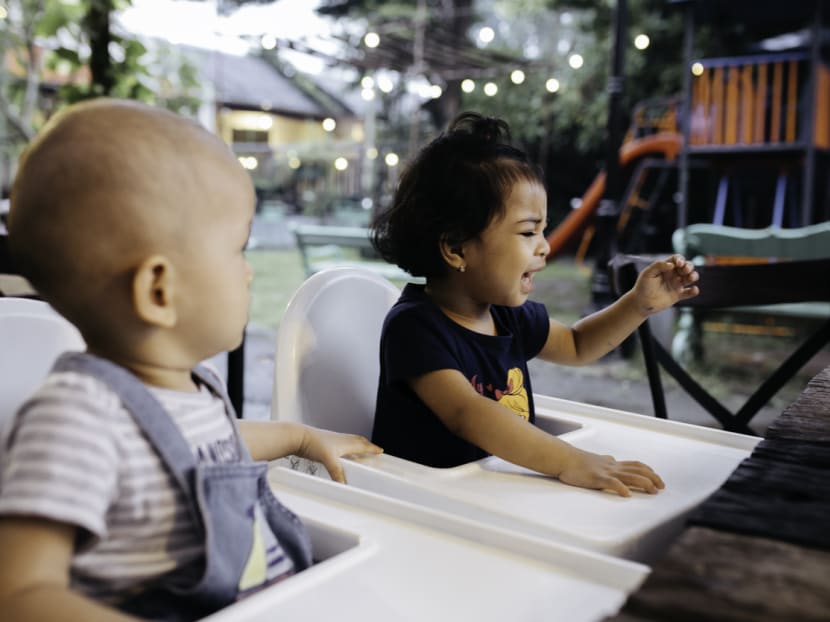Commentary: ‘Screaming children surcharge’ - overindulgent parents spoil it for the rest of us doing our best
Those who do not control their kids spoil it for the rest of us when restaurants become less kid-friendly or impose a “screaming children surcharge”. Parents need to make an effort to manage children, but we’d all benefit from some empathy too, says Vivian Teo.

(Photo: iStock/rudi_suardi)
SINGAPORE: A restaurant recently made the news for introducing a S$10 “screaming children surcharge”. Angie’s Oyster Bar and Grill along Outram Road introduced the surcharge a little over a month ago. Diners were warned that they would be charged for screaming or uncontrolled children.
As a mother of two, I thought the policy sounded discriminatory towards families with young children when I first heard of it.
Though my children are now 10 and 12 years old, I still remember the baby and toddler years when they would have a crying fit, which could happen at any time, any place. Often, they were hungry, tired, overstimulated or feeling unwell; sometimes, for reasons unknown or for something as trivial as singing the wrong words to their favourite nursery rhyme.
In most cases, normal child behaviour might mean they can’t sit through a meal, no matter the parents’ best efforts. It doesn’t seem fair to discriminate against children just for being children.
Surely it falls to the parents to assess, when considering a restaurant usually for a leisurely sit-down meal, whether bringing young children is appropriate?
But putting myself in the shoes of the restaurant, it’s not hard to imagine that children running around unattended or disturbing other people is dangerous in a place with hot food and sharp cutlery, and disrespectful to those who just want to enjoy their meal.
OVERINDULGENT PARENTS
Many of us have been on the receiving end of unpleasant encounters, often with overindulgent parents.

On a ferry to Batam a few years ago, a toddler seated behind me was enthusiastically hitting the back of my seat. I turned to look at him, then turned back around without saying a word.
But “checking out” the disturbance seemed to have offended the boy’s mother who exclaimed loudly to her son, “Don’t do this. The lady in front is very short-tempered.” That said, she didn’t stop him from rocking my seat for the rest of the journey.
Instead of explaining that his actions were disturbing others, the woman pushed the blame on me for being “short-tempered” about his constant kicking, implying her son was not at fault.
A friend also recounted to me that she felt harassed in a restaurant when children kept approaching her to gawk and make comments about her child with special needs. She approached the adults accompanying those children to ask that they not disturb her and her son. After a brief reprieve, the children were soon back at it, with the adults either oblivious or choosing to ignore their behaviour.
PARENTING IS HARD
The problem quite often lies with parents who do not set the right boundaries for their kids or at that moment, are inattentive.
But no parent goes to a restaurant or any other public place wanting their child to misbehave.
Since becoming a mother, I have come to be more tolerant as I understand meltdowns and other challenging behaviours are inevitable. We are constantly bombarded by stimuli and research tells us the brains of young children have yet to be developed to the extent that allows them to manage their emotions and control their actions.
I’ve come to understand first-hand just how tough parenting is and how often and easily parents are judged by those who see only one side of the story.
Those parents you see letting their child wander around the restaurant? They may simply not have the energy to chase after the child after waking every two hours last night to soothe their crying infant. That child you see crying his lungs out? He may have special needs which you are not aware of.
Of course, parents must make an effort to manage their children in public places. It is our job to set boundaries so our kids understand what are acceptable and unacceptable behaviours.
Take a recent experience I had at a restaurant: A family with a pre-schooler took the booth behind ours. The boy began reaching over the low banquette, almost hitting my daughter and me. His behaviour was chided and corrected by his mother, who soon kept him to his seat with a children’s programme on her phone.
But damned if you do, damned if you don’t – distracting kids with a screen is also often judged by onlookers.
Some entertain kids with colouring materials and toys in restaurants and airplanes. They are not always successful but at least they try. Likewise, there are also those who quickly take their bawling child, who is too young to reason with or too worked up to calm down, out of a restaurant or theatre so as to not disturb others. Many responsible parents are just trying their best.
EMPATHY AND TOLERANCE
Yes, there are permissive or distracted parents who let their children run amok. And they spoil it for the rest of us when restaurants end up discouraging patrons from bringing young children, such as with this “screaming children surcharge”.
Listen: The hunt for global talent and where it leaves local workers
Angie’s Oyster Bar and Grill said that it has yet to impose fees for misbehaving children so far, but there is vigorous debate on social media about whether S$10 is expensive enough a deterrent, or how objectively “uncontrolled” a child or a parent’s efforts to manage them can be to warrant it.
Frankly, I’d much prefer if restaurants are upfront that they are not kid-friendly.
For instance, Tenshin at Regent Hotel states on its website that children under 10 years old are only allowed at the restaurant on Sundays and public holidays, while Tamarind Hill at Labrador Park states that it has a “no-child policy for children below the age of 14”.
Such policies are probably a win-win for all: Restaurants can better manage patrons; diners who prefer a quiet ambience can choose to visit child-free establishments while families with young children can opt for child-friendly restaurants.
But it would truly be sad to see more restaurants or public places introduce no-child policies.
Sure, it’s nice to enjoy a restaurant’s ambience or a conversation over a meal without noisy children in the background.
However, it would be better to live in a society where parents put in the effort to manage their children and others accept that children sometimes misbehave. Some empathy, tolerance and compromise can go a long way.
Vivian Teo was a financial journalist for 14 years. She is now a mother-of-two and children’s book author.












